 Who, in case you’re curious, include Dharmendra, Kishore Kumar, Nasir Hussain, Kumkum, Hari Shivdasani, Rehman, Asit Sen, Azra, and Aruna Irani, besides Telugu star Savitri. With, in smaller roles, everybody from Tuntun, Brahm Bhardwaj, Mridula Rani, Manorama and Jankidas, to child star Master Shahid. [All that was missing was wonder dog Tommy].
Who, in case you’re curious, include Dharmendra, Kishore Kumar, Nasir Hussain, Kumkum, Hari Shivdasani, Rehman, Asit Sen, Azra, and Aruna Irani, besides Telugu star Savitri. With, in smaller roles, everybody from Tuntun, Brahm Bhardwaj, Mridula Rani, Manorama and Jankidas, to child star Master Shahid. [All that was missing was wonder dog Tommy].
In an increasingly long list of films I’ve watched because I’ve fallen in love with their songs (in this case, Machalti hui hawa mein chham-chham and Chhedo na meri zulfein), Ganga ki Lehren is the latest. I had assumed—by watching the videos of the aforementioned songs—that Kishore Kumar and Kumkum were the leads here. So discovering that they were only two in a plethora of actors was a surprise. Devi Sharma, producer and director of Ganga ki Lehren, obviously pulled out all the stops when getting together the cast for this film.
Several years ago, I’d reviewed Bhabhi. Not an enjoyable film (though it had some good songs). What did impress me was the writer’s obvious dedication to the task of educating the film’s audience. Entertainment, he/she had apparently decided, is all very well, but a film should leave you with important lessons for life too. Unless I am mistaken, the same person who wrote the script for Bhabhi also had a hand in writing Ganga ki Lehren.
We begin at a mandap, where Seema (Savitri, looking rather hefty) is about to get married, when her prospective father-in-law (Brahm Bhardwaj) springs up and calls a halt to the proceedings. He has found out that Seema’s family are bhaands, not the thakurs they’ve been pretending to be. He refuses to have his son marry a naachne-gaanewaali. Seema’s brother and her younger sister Uma (Kumkum) protest, but to no avail. Bhaiya even takes off his pagri and lays it down, begging for mercy.
At this juncture, in steps a wedding guest, Ashok (Dharmendra, looking gorgeous and acting stern as he advises the angry would-have-been-Seema’s-father-in-law that he’s not being nice). With the result that the man turns around and snaps at Ashok: if he’s feeling so very sorry for the woman, why doesn’t he marry her himself? [Lesson 1: Think through stuff very well before offering free advice, because you might end up being saddled with more than you bargained for].
Ashok, however, is a devta [not my words, but his grateful suddenly-brother-in-law’s]. He agrees, and is married right there and then. His new brother-in-law is so effected by this, and so tearfully grateful, that he cops it. Odd reaction, but basically what it boils down to is that Ashok is now not merely saddled with an unexpected new bride, but also:
- The responsibility of performing the last rites of the dead man, and
- Uma, who has nowhere to go, and doesn’t baulk at being a kabab mein haddi.
With Seema and Uma in tow, Ashok goes to his own very palatial home. He leaves the two sisters in the car, telling Seema that he’d like to tell his father first.
Father, Diwan Jiya Lal (Nasir Hussain) is not pleased. In fact, he is so furious that he yells at Ashok that he won’t have anything to do with either him or his bride. Ashok, whose devta-ness asserts itself, decides to stand by Seema…
…who, it turns out, had gotten bored of sitting in the car, had come around to outside the drawing room window, and has therefore heard everything. She has now raced off to commit suicide, and Ashok just about manages to stop her jumping off the edge of a cliff. [Lesson 2: if someone tries to kill themselves, don’t merely pat them and coo lovingly. They need therapy].
The long and the short of this is that Ashok, Seema and Uma move to another town (by the Ganga). Ashok takes up a job—not too well-paying but adequate—and soon enough, a baby boy is born. Munna, as soon as he’s old enough (and is now played by Master Shahid), begins to call Uma ma and Seema didi. [Yes, confused child, but there’s a lesson here as well. Lesson 3 is that you should nip such muddle-headedness in the bud, because it can lead to much, much worse].
One day, while Uma and some random female friends [who never put in an appearance after this] are out singing and dancing beside the river, when Munna, running to meet his ‘ma‘ falls into the river [Lesson 4, here: riverside towns are unsafe places to live in], and nearly drowns. He is saved by the timely intervention of a stranger, Kishore (Kishore Kumar) who had, unasked and uninvited, joined Uma and her friends in their song.
Wiped down and comforted, Munna is taken home. Kishore has already fallen in love with Uma, and she with him, though neither of them says so yet.
Meanwhile, Kishore’s very wealthy father (Hari Shivdasani) has been planning to get wealthier still, by arranging a match between Kishore and Neeta (Aruna Irani). Neeta is an heiress, an orphan who is looked after by her elder, worldly-wise sister Ragini (Azra). Ragini is optimistic about the match, and assures Neeta –who expresses doubts, since she’s crippled–that her legs are being treated, and she will be well soon enough.
There’s some rigmarole now, what with Kishore, in a love-induced stupor, mistaking Neeta’s photo for Uma and saying he likes her very much, to his father. Father, of course, is delighted. When, in a slightly less dazed state, Kishore realizes what he’s done, it’s too late. No, he’s not married yet, but Father simply refuses to have the match called off. Kishore ends up seizing on the one way he can to put the wedding off for a while: he pretends to be mad.
Meanwhile [there are lots of meanwhiles in this film], Ashok reveals to his little family that he has lost his job. Now, even though he’s been going out every day to search for employment, he’s been unsuccessful. They have never been rich, this little quartet; now they’re even worse off.
Seema tries to find work as a seamstress, but is no good at managing deadlines. When she gets told off by an irate client (Manorama), Ashok realizes that his wife has been working, and immediately puts a stop to it. While he is alive, how can the women of his household work?! [Yes, well. Considering he’s not being able to earn a phooti kauri, he’d better keep shut].
Next, Uma, realizing how bad things are, goes out looking for a job–and ends up finding one as companion to a wealthy man’s ‘child’, who has gone mad. And who should the child be, but Kishore? [This is just the first of many many coincidences, each successive one more far-fetched than the last].
Kishore’s father, completely unaware that this is the girl Kishore actually wants to marry, is very happy to see swift progress in Kishore’s case: his bachcha’s madness seems to be disappearing really quickly.
But that’s all ephemeral. Because when Ashok comes to know that Uma has taken up a job [employed, and a woman of his family? Horrors!], he is madder than a wet hen, and immediately forbids Uma from working any more. It’s only when Kishore’s father comes to plead, saying that Uma’s been a huge help, that Ashok finally relents. But on one condition: that Uma will visit as a friend, a companion. Not as an employee. So, basically, we’re back to square one: no money. [Where Uma, who is constantly in silk saris or salwar-kurtas and wears nice enough jewellery gets all that from, is anybody’s guess].
Things are so bad by now that Seema, always a religious sort and given to singing her signature bhajan, Jai jai hey Jagdambe mata, even takes Uma along with her to the temple, where the two of them teach it to a horde of other devotees. [Lesson 4: if there’s a song only you know, teach it to others. Always useful].
And not a moment too soon. Ashok has finally gotten a job:- as chauffeur to Neeta, the girl Kishore’s father wants him to marry. [Those coincidences, again]. He hasn’t been on the job too long before one day, back home, Ashok suddenly reels and blacks out. The doctor who’s summoned has a quick look, and [why can’t all doctors be as efficient as this?] without the aid of any tests or specialized equipment or anything beyond a stethoscope, pronounces that Ashok will continue to suffer these sudden blackouts unless his eyes are operated upon immediately. The operation will cost Rs 3,000…
… Which, of course, they do not possess. Uma gets it by winning a dance competition [observation: how easy it is, in Hindi cinema, to suddenly get hold of money, a chance to travel, etc–all you do is participate in a competition, whether dance or song or beauty pageant–and you win. Always]. Ashok, as pigheaded as ever, of course refuses to have anything to do with it and throws out the money. This guy is getting on my nerves.
Since Seema doesn’t seem to be doing very much in a practical way, Uma takes it upon herself to help–by writing, pretending to be Seema, to Ashok’s father, telling him what’s happened, and asking for the money.
Ashok’s father, who’s mulish enough [blood will tell] to still blame his unseen bahu for all the ills that have befallen them, sends back a curt reply: get out of Ashok’s life, and send him back to me. I will look after him.
And Seema, when she accidentally happens to see that letter, decides there’s only one thing to be done: get out of Ashok’s life, by committing suicide. By drowning in the Ganga.
This, by the way, being nowhere close to the end. Because there’s loads to come, including Rehman, Mridula Rani, Jankidas, amnesia, blindness, reunion-thanks-to-a-song, mistaken identity, more pigheadedness on the part of various men and some utterly infuriating Main Chup Rahoongi-ness on the part of a certain woman.
What I liked about this film:
Chitragupt’s music, with lyrics by Majrooh. My favourite songs are the frothy Machalti hui hawa mein chham-chham and Chhedo na meri zulfein, but a surprising hit for me–considering the fact that I’m not usually fond of bhajans–was the melodious Jai jai hey Jagdambe mata, which I found restrained and beautiful.
The pace of the story and the general entertainment value. Even though all my asides in the synopsis may seem to indicate otherwise, this film is really not bad as far as story goes. It moves along at a rattling pace, with new twists and turns [not to mention coincidences] every few minutes. Yes, it does get melodramatic in the last half-hour, and just about everybody–Ashok, Seema, Ashok’s father, Kishore, Kishore’s father, even Uma–made me see red and want to bash them over the head at some time or the other during the course of the film, but still.
What I didn’t like:
Savitri, who sticks out like a sore thumb as Seema. She just doesn’t fit with Dharmendra–the chemistry between them is zero. In fact, more than once during the film, I found myself wondering what the scriptwriter had been intending, since Ashok and Uma seem to share a camaraderie and an easy friendship –even though it is that of jija-saali –which makes them appear far more convincing as two people close to each other than do Ashok and Seema. Savitri’s acting is adequate (as it is, she isn’t expected to do too much), but that’s about it. Kumkum as Seema might have been a better choice.

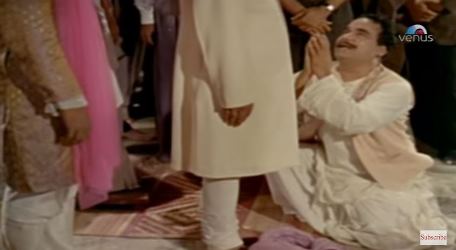
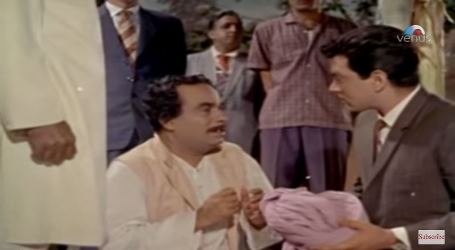
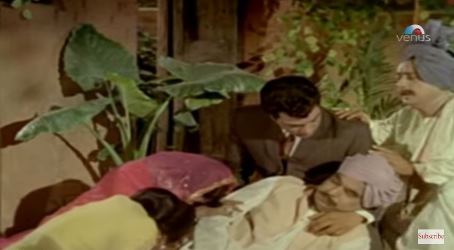
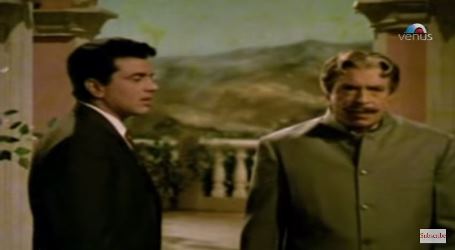
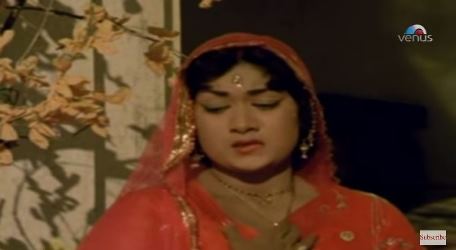
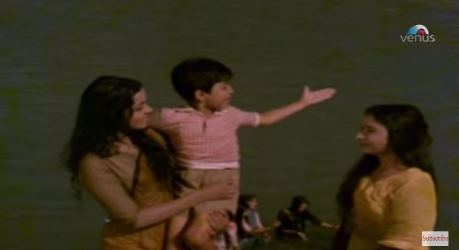
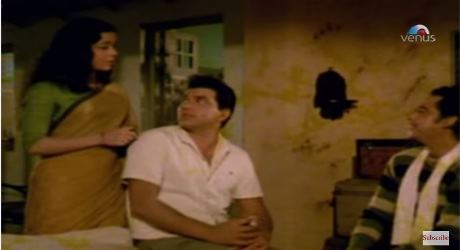
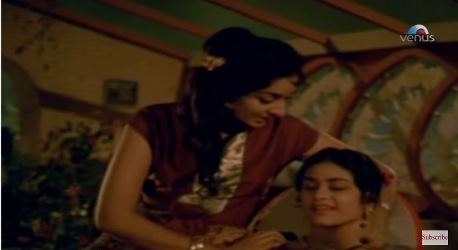
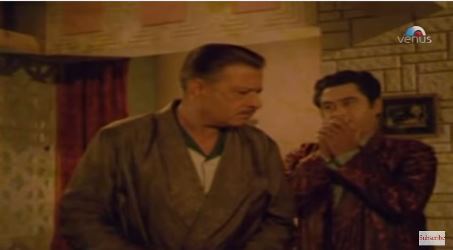
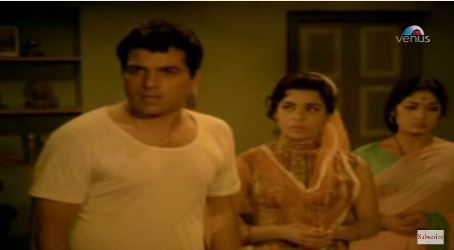
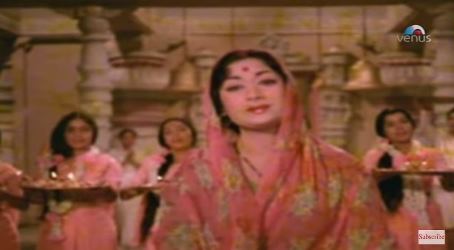

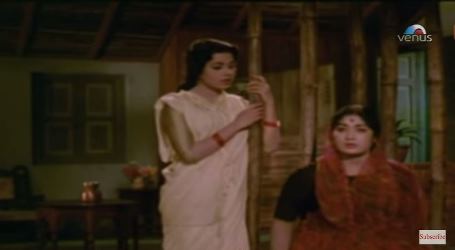
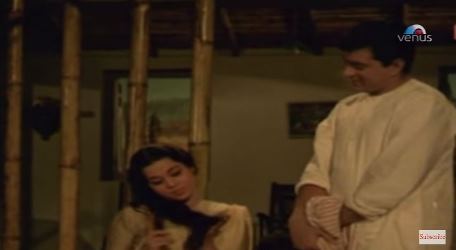
Wonderful
Brings back old memories
Chemo na zulfein was a hit and now the melody lingers.
A hundred thanks
LikeLike
Thank you! Yes, the songs are lovely. :-)
LikeLike
Wow, so Kishore Kumar and Kum kum are not the main leads of this movie??? And Dharmendra with Savitri?? – who on earth cast them together?
Thanks, Madhu! Your review sounds like a lot more fun than the actual movie! :-)
LikeLike
The Dharmendra-Savitri pairing was the biggest (and not very pleasant!) surprise for me. And, considering the best songs of the film are picturised on Kishore and Kumkum… yes, well. Their being just the secondary jodi is kinda weird. But hey, don’t fret. No need to watch this film. ;-) Seriously, Harini. This is quite avoidable. Not outright bad, but not worth wasting your time over.
LikeLike
I saw this movie as a child, and remember nothing of this. Only the song Machalti hui and Kishore saving the drowning child. Also, at least one of the suicide attempts.
I do love the songs, and would not mind watching the film.
LikeLike
Yes, the songs are beautiful. And it’s not outright bad as a film either (I mean, if you don’t mind melodrama in places – and which of us, fond of old Hindi cinema, hasn’t got used to melodrama in generous doses?!)
LikeLiked by 1 person
Haha! Remember one time Raja had posed the ‘Top Stars’ in a quiz?
LikeLike
I don’t! :-( What was that about? On PKK?
LikeLiked by 1 person
Yes. You and I had raked our brains about it. I think we gave up and Raja had to tell us about it.
LikeLike
I need to go and search for that again. It’s gone clean out of my head.
LikeLiked by 1 person
Ha! Thanks for this, Madhu, now I can safely not watch the film. Just reading your review made me want to strangle Seema (or perhaps drown her, since she seems to want to throw herself into the Ganga at every given opportunity!) – ugh! And the good lord (or whoever is up there) save me from devtas like Ashok!
Besides, doesn’t Savitri look a tad too old to be a ‘girl’ of marriageable age?
Loved, loved, loved your comments! If I ever make the mistake of watching this film, it is only the memory of these that will make it palatable. (After all, lesson learnt from your review – one cannot actually kill oneself if one is laughing too much!)
LikeLike
Regarding Savitri being too old to be a girl of marriageable age, I guess the director thought that if Meena Kumari could be one in Akeli Mat Jaiyo and many other movies, why couldn’t Savitri, who was about the same size, do it too? Just a guess on my part.
LikeLike
Akeli Mat Jaiyo, I thought, was one of those films where Meena Kumari didn’t look too old, actually. But yes, “and many more movies” also includes stuff like Pakeezah, Ghazal, Chandan ka Palna etc, in all of which she looked downright haggard, plump and puffy-eyed and far from young. I remember being totally flummoxed when, in Pakeezah, at one point she’s mentioned as being 16 or 17 years old.
My main grouse is with Savitri being paired with Dharmendra, since he looks far too young to be playing opposite her. (Then, of course, the Meena Kumari-Dharmendra pairing in Chandan ka Palna was far from convincing, either…)!
LikeLike
“Besides, doesn’t Savitri look a tad too old to be a ‘girl’ of marriageable age?”
Exactly. She certainly looks old enough to be Munna’s mum, but a nubile bride? Nah. And she and Dharmendra have zilch in the way of chemistry. I have a sneaky feeling this was something like Pandari Bai in Bhabhi: well-established Southern actress possibly reprising a role in Hindi cinema, and cast with a Hindi film actor. I wonder if that was the case.
LikeLike
Maybe that was the crux of the story of her not being of what was then called as respectable marriageable age, what with her coming from ‘naachne-gaanewale’ background. And since she has to be true to sati-savitri role, the director might not have the guts to stress on that point, particularly her past. Maybe that also explains, why Dharam’s character doesn’t want the sisters to ‘work’, because their ‘job’ was something different and they might fall to their old ways. In 60s, I think, it was quite common for women to have paying jobs. In the late 50s and 60s, all my aunts and also mother had started working as nurses or telephone operators (both of which need night shifts) and managing the households and their brothers or husbands didn’t oppose it. Why, even my maternal grandmother came alone to Bombay in the 1920s and took up a job in a factory. Okay, that was opposed, but she was a woman of a strong will. But in the 1950s and 60s, it was totally normal for women to have jobs, I think. Wasn’t there a film on working women (that is having paid jobs) with Mala Sinha and Bharat Bhushan, which you have reviewed?
LikeLike
I didn’t elaborate, but the defence they offer when the prospective father-in-law accuses them of being bhaands is that they are not; their ancestors were, but they are perfectly respectable people. So I don’t think that quite fits your argument.
However, I do agree that it seems really odd for a man (educated, too!) to be so opposed to having his womenfolk work, especially when it’s in such desperate circumstances. Like your aunts, grandmother, etc, all the women on my mother’s side of the family too have worked. My nani used to be a nurse back in the 1930s, and my mother taught in school before her marriage as well as after. True, there were restrictions: my nana and his father believed that the only respectable job for a woman was teaching or nursing, but still. At least they didn’t stop that!
The Mala Sinha film about working girls is Gyaarah Hazaar Ladkiyaan. :-) I am impressed with your memory, Harvey!
LikeLike
Sometimes I’m impressed with my memory too. But only sometimes. :D
That reminds me, I should visit it once again.
LikeLike
:-D
LikeLike
You don’t really learn, do you? But it was high time that you came up with a review of a film you didn’t like, I’m glad you watched the movie and shared it with us. Now laden up full of wisdom from the lessons, I go swearing once again never to watch a film with relationship words in it and Ganga.
Chhedo na meri zulfein IS a good song, nevertheless.
Thanks for the hilarious review.
BTW, my great grandparents got married somewhat on the same lines like Dharam and Savitri with the exception that my great grandmother’s brother didn’t die and in the fact, that she refused to marry her prospective groom. Just imagine, if she hadn’t done that, I won’t be sitting here and writing this comment. This should teach me to have more respect for such films. ;)
LikeLike
“I go swearing once again never to watch a film with relationship words in it and Ganga.”
Hehe! Though Pacifist was sweet enough to unearth Bhabhi ki Chudiyaan for me, so I will make an exception for that. :-)
Your great grandmother actually had the guts to refuse to marry her prospective groom? In that day and age? I’m guessing this must be at least early 20th century, if not late 19th…? What a courageous lady. I applaud her. If you don’t mind sharing, how did that happen?
LikeLike
Yeah, everybody is singing paens of Bhabhi Ki Chudiyaan (Anu has written a good review of it). At times even I’m tempted to watch it, but then I think I haven’t seen so many good films, which I ought to see. Comes time, comes film! ;)
Okay, I might have exaggerated the bit of my great grandmother refusal to marry her prospective bridegroom. No, it was not a scene, where the bride stands up in the middle of the mantras being recited and says, “ye shaadi nahin hogi!”. She did refuse, but even her parents were very easily convinced and so were the ‘biradari ke log’, since the prospective bridegroom had many ‘affairs’ with other women going on and also secretly married or something. So her refusal didn’t meet with a big opposition. And since the whole preparations were already made and all relatives summoned and the brahmin already paid, it seemed a pity to let it all go waste, so my great-grandfather jumped in just like Dharmendra in the film and they got married. His parents weren’t there, so there was no fuss. This must have happened sometime in the late 1890s. Sometimes I like to think that they already knew each other and were in love, but my great-grandfather didn’t have the guts to propose or was too much of a simpleton for it, which according to the reports handed down, he was. Anyway, from then on she managed all his business affairs and the household. I remember, when I was small and had visited the village, where my father’s family hails from, people would tell me how my great grandmother had helped their family or how resolute she was and ask me to be true to that tradition. And I was like, why? Why put such a pressure on a 5 year old kid? But anyway, I didn’t turn up anything like her. :D
But it would have been nice to meet her.
LikeLike
What an absolutely fascinating story. And what an absolutely admirable lady your great grandmother must have been! Kudos to her. So inspirational!
Thank you for sharing that, Harvey!
LikeLike
Thank you, Madhu!
LikeLike
I saw this film on good old Doordarshan, long, long ago, a truly forgettable film considering I have no memory of the film excepting the songs. I just love them. Incidentally old films of the sixties make me nostalgic, I yearn for those days of wonderful music compositions, lyrics and of of course the singers. There is something else too, (HA! HA!) the heroes those days invariably had the name Ashok and the heroine’s father was most often than not called Mr.Sharma, usually Mohan Sharma. HA! HA!.
LikeLike
Yes, Ashok was such a common name in Hindi cinema back then, wasn’t it? And Mohan. If you were a decent, well-brought up young man, you were almost certain to be either of those!
This is a forgettable film, Shilpi; you’re right about that. I watched it just a couple of weeks back, and already the finer details of the plot (it gets even more convoluted beyond the synopsis I’ve given) have fluttered out of my memory.
LikeLike
Ha, Ha! Great review, Madhu. Have seen the movie decades ago and my memories of it aren’t nearly as pleasant as my memories of your hilarious review will be.:-) Like you, loved the songs, including the bhajan – you’re right it’s a catchy yet restrained number.
Speaking of movies with a “water” theme/setting, have you seen “Ferry” with Dev Anand and Geeta Bali? It’s a pretty decent movie with an unusually restrained and mannerism-free performance by Dev Anand.
LikeLike
Glad you liked the review, Shalini! Thank you. :-)
I have watched Ferry years ago, on Doordarshan. I have only a very vague recollection of it (so vague, in fact, that I had forgotten it also starred Geeta Bali) but I did remember that I liked Dev Anand a lot in it. He was so different in that film from the ‘usual’ Dev Anand I’d seen till then. Must hunt out that film and watch it again.
LikeLike
Never knew Savitri acted in this in a weak role. As a Telugu Speaking person I must say that she was a great actress but wonder why she opted for this movie and why the director casted her. You must watch her in the Telugu Epic Mayabazar..
– Ravi
LikeLike
Thank you for the recommendation! I must look out for Mayabazaar. I hope I’m able to find a subtitled version. That is a major complaint I have with a lot of old regional cinema (barring Bengali, where there seems to have been, at least in recent years, a concerted effort to subtitle films): it is so difficult to find subbed films. And there are so many films I want to see!
LikeLike
As I loved your review. You could be doing these films as one of those series like MAD comics, only you are so good at bringing out the humour that you don’t need to rewrite the story
LikeLike
Thank you so much, Bawa! You should see the grin on my face – ear to ear. Glad you liked the review.
LikeLike
I was grinning ear to ear reading it!
LikeLike
:-)
LikeLike
“observation: how easy it is, in Hindi cinema, to suddenly get hold of money, a chance to travel, etc–all you do is participate in a competition, whether dance or song or beauty pageant–and you win. Always”
Ha! Not just that it is so convenient to win such competition but the amount is also usually the exact sum that is needed.
Also, funny was the way brother-in-law died. I am disappointed for Nassir Hussain to pass on that opportunity. :)
I love the hilarious lessons you have laid out through the review. Very funny, Madhu. I am going to steer clear from this movie but on second thoughts may be it’s worth watching just to reconcile it with your observations/lessons. Well done!
Chhedo Na Meri Zulfen is such a nice song, love Kishore’s early stylish mannerisms.
LikeLike
“Also, funny was the way brother-in-law died. I am disappointed for Nassir Hussain to pass on that opportunity. :)”
Yesss! That could have been his opportunity to do some theatrical chest-clutching! The actor who played the brother-in-law was far too tame by comparison. ;-) On the other hand, it was a very short role, so probably whoever was doing the casting decided Nasir Hussain should be kept for the longer old-gentleman role.
If you do decide to watch (and, really, it’s not half as bad as I make it out to be), Ganga ki Lehren is on Youtube too.
Talking about people winning money in competitions etc, another film I was thinking of when I wrote that was Prem Pujari in which Waheeda Rehman’s village girl has to go to Europe in search of her sweetheart, and since she doesn’t have the money, she decides to enter a beauty contest… and wins! Becomes Miss India and goes off to phoren lands, exactly where Dev Anand is.
If only life were such a cakewalk.
LikeLike
Ha ha! Life simplified!
“There’s some rigmarole now, what with Kishore, in a love-induced stupor, mistaking Neeta’s photo for Uma and saying he likes her very much, to his father. Father, of course, is delighted. When, in a slightly less dazed state, Kishore realizes what he’s done, it’s too late.”
Another classic misunderstanding, way too common for the movies. To heck with those photos and frames. They mean a lot in hindi movies. A photo-frame is placed with a purpose in every scene as they say. A seasoned movie goer already starts to imagine how this frame is going to impact the movie, whenever he/she comes across one on screen.
:)
LikeLike
Hah! Well said. :-) I find it ridiculous, how people can be so dazzled by love that they see their love’s features in every stranger’s face.
LikeLike
Just because I’d time on my hands, and because I used that to read your review again and giggle away like a lunatic, I decided to respond to your lessons (just to teach you a lesson, my girl – do not write reviews that cause your readers to snort coffee over their keyboards!) So here goes:
1. Entertainment, he/she had apparently decided, is all very well, but a film should leave you with important lessons for life too.
A lesson you seem to have taken to heart as well, giving us plenty of gyan in your review. :)
2. [Lesson 1: Think through stuff very well before offering free advice, because you might end up being saddled with more than you bargained for].
A lot more, in the case of Savitri, if your screenshot does her any justice – that was ‘two for the price of one’ at that point.
3. [Lesson 2: if someone tries to kill themselves, don’t merely pat them and coo lovingly. They need therapy].
One should also teach them that a) well-brought-up young ladies do not eavesdrop on conversations; b) eavesdroppers never hear good of themselves. [Seema must have been asleep during Moral Science classes in school!]
4. Lesson 3 is that you should nip such muddle-headedness in the bud, because it can lead to much, much worse]
And if you can’t [nip this in the bud], you should drown all Hindi film children in the conveniently situated river/pond/tank.]
5.[Lesson 4, here: riverside towns are unsafe places to live in],
Or convenient ones; see response to Lesson 3.
6. [Where Uma, who is constantly in silk saris or salwar-kurtas and wears nice enough jewellery gets all that from, is anybody’s guess].
C’mon, Madhu, she had them stitched and made for her sister’s wedding; now that she has it, she might as well wear it, no? *shaking head sadly* You haven’t watched enough of such films, Madhu; your education is sadly incomplete.
7. [Lesson 4: if there’s a song only you know, teach it to others. Always useful].
Well, you never know – they are siblings; what if they get lost? C’mon, Madhu! I expected better from my masala sister!
8.get out of Ashok’s life, by committing suicide. By drowning in the Ganga.
Please tell me she succeeds? Because I feel like drowning her. And Ashok. And Kishore.
(And now before you feel like drowning me, I shall take myself away.)
LikeLike
LOL! Thank goodness I’ve not yet started on my mug of coffee, or I’d have ruined my keyboard. Anu, you’re a scream. :-D
“7. [Lesson 4: if there’s a song only you know, teach it to others. Always useful].
Well, you never know – they are siblings; what if they get lost? C’mon, Madhu! I expected better from my masala sister!”
What? Just siblings? You’ve forgotten the devta pati (whose eyes, conveniently, need to be operated upon?) You’ve forgotten what happens to people when they jump into rivers and may get concussed?
“A lot more, in the case of Savitri, if your screenshot does her any justice – that was ‘two for the price of one’ at that point.” Hehe! Khaate-peete ghar ki lagti hai right? I shouldn’t be saying that, considering I’m no sylph myself, but then, I’m not an actress pretending to be a nubile young bride, either.
LikeLike
Perfect review for me to read on my return from a brief sojourn in the hospital – three days this time – the best part of the review being all your lessons! But I didn’t understand why you raised some of those questions. After all, you yourself have asked me in the past not to ask questions like Where did she get the money for all those nice clothes if they have no job and no money, or the efficiency of the doctor who can diagnose without expensive and time consuming tests. In fact, it looks like you need a quick review of some rules for Hindi masala films, and I am glad Anu has taken it upon herself to do that, since I am too sleepy to do that myself. But, hey, all these Hindi movies that you have watched and reviewed, and you are still asking questions? Tsk, tsk, Madhu!
Why was Dharmendra saddling himself with heroines who looked like his mother?
I will keep this movie in mind for our next hospital visit. I was watching Teesri manzil this time. Thanks, Madhu, for the pointer!
LikeLike
“In fact, it looks like you need a quick review of some rules for Hindi masala films”
Which makes me wonder, seriously, where some of these people got their ideas from. I mean, some of these things are so ludicrous, anybody would laugh. Like that age-old thing of a doctor being able to tell that a woman is pregnant just by checking her pulse! Honestly.
“Why was Dharmendra saddling himself with heroines who looked like his mother?”
No idea! But he seems to have been in several films like that, no? Cast opposite women much older than him (and showing their age, too).
LikeLike
“Like that age-old thing of a doctor being able to tell that a woman is pregnant just by checking her pulse! Honestly.”
—> Do not blame dear Hindi movies for this, Madhu! I had a dotty, doddering, old G.P in the Netherlands, who actually would check the pulse and decide whether a woman was pregnant or not. And the one time he proclaimed that I was, I most certainly was not! :p
LikeLike
Hehe! That goes to show, no? That you can’t, really. :-D
LikeLike
Like that age-old thing of a doctor being able to tell that a woman is pregnant just by checking her pulse!
I seem to remember that you, Harvey and I had a discussion about this before – I know it appears ludicrous to us, but I knew several older women when I was a child, who used to know a woman was pregnant just by looking at her. (Even if she didn’t look obviously pregnant to anyone else.) And as far as I can remember, they were spot on. I used to find it very interesting. I wonder how they could do it; years of experience, perhaps?
Some of the old GPs knew a lot more than today’s ‘specialists’ anyway, perhaps because they treated such a wide range of ailments, and were taught to actually put two and two together and make four.
That said, the scenes where a doddering old doctor would check a woman’s pulse and announce her pregnancy always made me giggle, because to my ‘modern’ mind, that seemed a bit implausible. :)
LikeLike
You know, this reminded me of something my mother talks about. Long ago (this must have been very late 60s), my mother was staying with her in-laws in Saharanpur, when she developed a very bad stomach ache. There was nobody to fetch the doctor (and no telephone at home) but there was a dalit Christian woman called Naura who used to live nearby and was reputed to know ‘gharelu nuskhas‘. So Naura was fetched. She made Mummy lie down and bare her stomach. Massaged it once or twice, then took a length of black thread and tied it firmly around Mummy’s big toe. And the ache was gone!
I would’ve thought that the massaging was what cured Mummy, but the same thing was repeated some time later with an uncle of mine. Naura, again summoned, was too coy to get him to bare his stomach, so didn’t massage him – she just wound the black thread on his toe. God knows how and why, but he got immediately all right, too.
Utterly implausible.
LikeLike
As my grandmother used to be fond of quoting: There are more things in heaven and earth, Horatio, than are dreamt of in your philosophy. :)
I remember once, when my oldest was a baby, he spent the whole night crying – colic, I think, and nothing we did worked. He wouldn’t even nurse. I was a ragged mess by the time morning rolled around, and the baby wouldn’t go to anybody else. He was still crying when my neighbour maami came around to enquire (we lived in flats then; everybody knew everything, and obviously, a kid crying the whole night would have disturbed them as well): she asked for some hing, mixed it with warm water and poured it into my son’s belly button, drop by drop. It was like a miracle – he stopped crying at once, and then nursed so hungrily – no one would have said he’d been crying only seconds ago.
LikeLike
Wow. I’ve never heard of that particular remedy for colic, but heeng, bundled into a soft cloth, warmed gently on a tawa,and applied on a baby’s tummy seems to work, too. And is widely used – I had an Assamese acquaintance recommending it, and my mother-in-law (who’s Punjabi), and our driver (who’s from UP). Some variations, of course – like one of them recommended adding ajwain to the mix – but it seems to be common.
Considering it’s not ingested, merely applied, I wonder how it works. But it does.
Your grandmother was very right!
LikeLike
indeed a great review.. the chemistry between dharmendra and savithri is boring. saw this movie long before..
can you please give a review of film kaajal 1965.
LikeLike
Thank you! I’m glad you liked the review. :-)
I’ll try to review Kaajal. Years since I watched it (and I don’t particularly like it either, except for the songs).
LikeLike
“We begin at a mandap, where Seema (Savitri, looking rather hefty) is about to get married…”
Savitri may or may not have actually put on weight since her younger days, but the idiots that uploaded it to YouTube stretched a 1.33:1 movie to fill YouTube’s 1.78:1 widescreen player, so everyone in the whole movie looked equally ‘hefty’. You watched this one, right?
You can also get rid of the obnoxious ‘Subscribe’ button in all of your pictures by clicking the ‘Settings’ button (the gear thing in the lower right corner of their player) and turning off annotations. But I’m afraid you’re stuck with their stupid ‘Venus’ logo (also in the wrong aspect ratio).
LikeLike
Oh, okay. I hadn’t realised the ‘Subscribe’ button could actually be turned off from the Settings. Usually, I’d have photoshopped it out of the screenshots, but I just didn’t have the time this time. Thanks for that, Tom.
Though, if you look at screenshots featuring Savitri with other people (for instance, Kumkum) you can see that she’s definitely much wider than the others.
LikeLike
Your most amusing review and the readers’ comments have surely turned this movie into hansi ki lehren. Have seen it in the past on the big screen while visiting Haridwar with family. It was showing to housefulls ! Now I know why I did not remember any of the story except for the songs. I have been tempted to watch it, but now I will stear clear thanks to you :).
LikeLike
Thank you, Neeru! I’m so glad you liked it. To be fair, it’s not much worse than a lot of other old Hindi family dramas (and the music is great), but still. So many silly tropes.
LikeLike
Hilarious
LikeLike
Thank you!
LikeLike
Just read the review here, very well written. I read comments about why Savithri was the female lead. Simple reason: She was the unofficial producer, she financed the movie. One of the many that she made which made her lose all her money.
LikeLike
Ah. Thank you for clearing that up. Since I wrote this review, I’ve seen a couple of Savitri’s Telugu films, including Maya Bazaar, which I loved. She shouldn’t have done this one, it’s such a travesty compared to the wonderful films she’d already been part of.
LikeLike